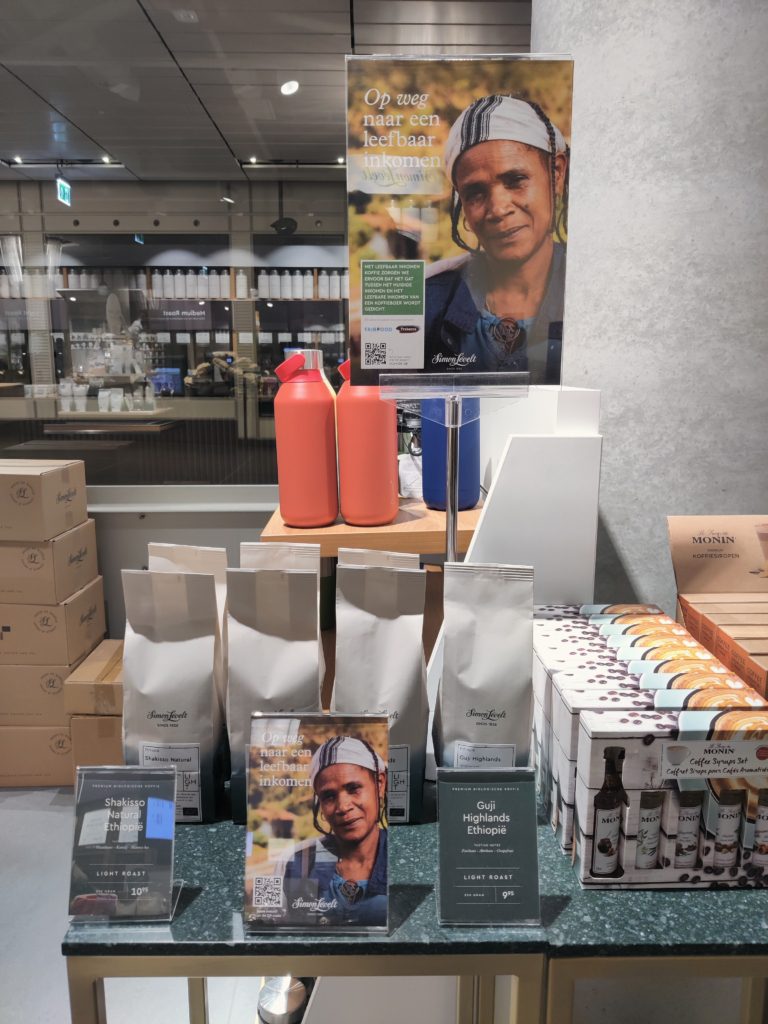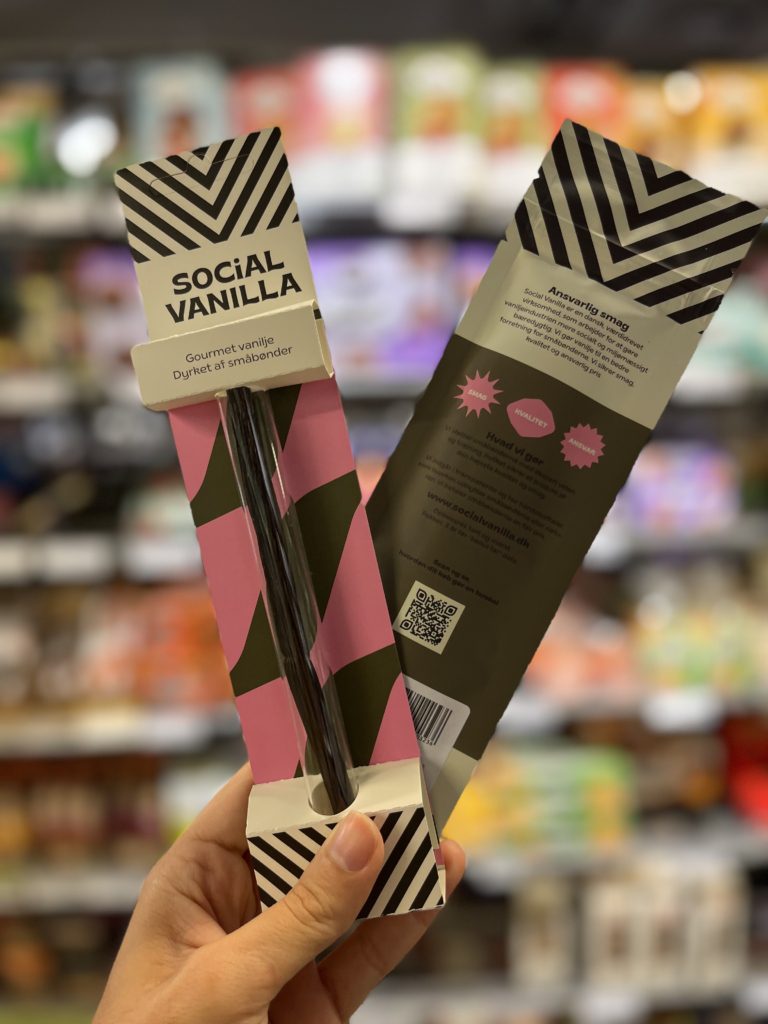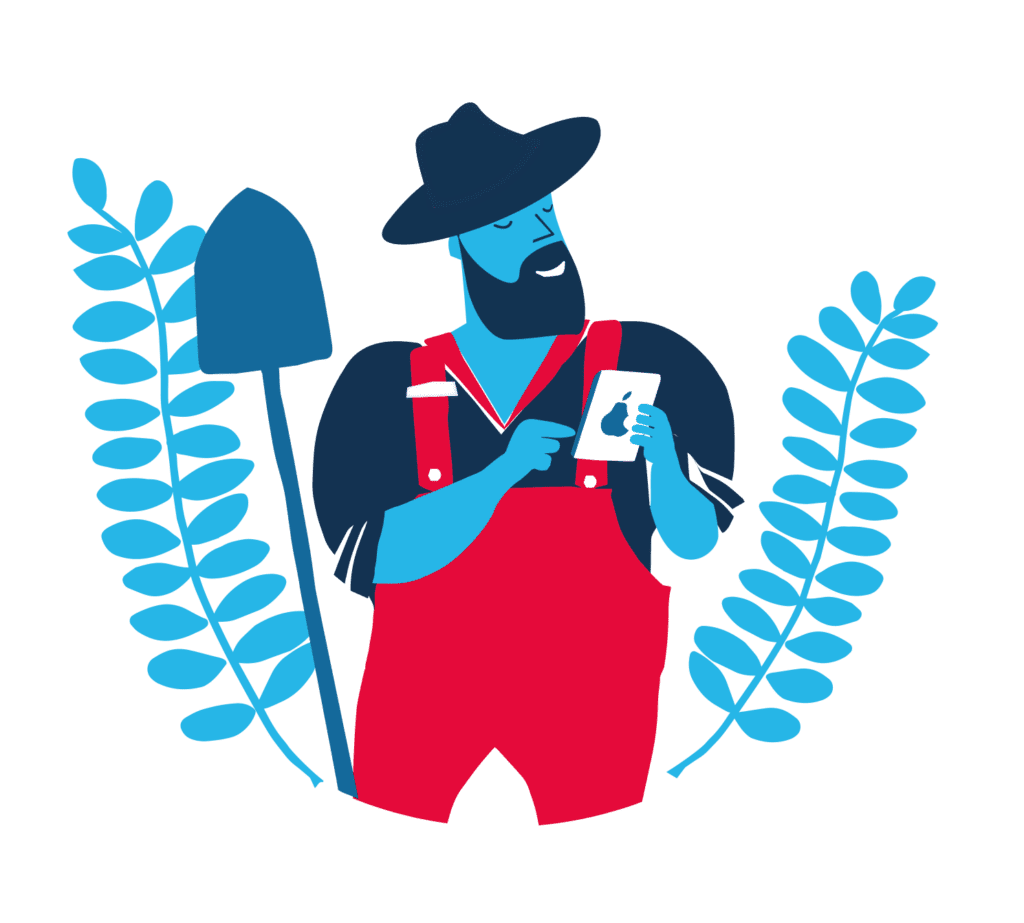This chapter shows how our solutions translated into impact in 2022 through our partnerships with companies such as Dole Europe B.V., Trabocca, and Verstegen Spices & Sauces.
RECLAIM Sustainability!
2022 was the year to start reaping the fruits of the RECLAIM Sustainability! pilots. Within this joint initiative to foster genuine sustainability in international value chains – in partnership with Solidaridad, the Dutch Ministry of Foreign Affairs and other partners – Fairfood’s pilots investigate the added value of transparency for farmers and companies. We are focussing on smallholder cocoa and coffee farmers in Uganda, Honduras and Sierra Leone. Together with traders and buyers, CSOs, farmers and government institutions, Trace is enabling stakeholders to record transactions and share evidence of payments to farmers on a blockchain, allowing them to meet sustainability standards.
To make this happen, this year we onboarded important partners to the programme. The coffee beans from the Ugandan pilot will end up in a special blend of Fairtrade Original, which launched an ambitious journey to close the living income gap. In Honduras, where we started our operations in 2021, we maintained our relationship with coffee cooperative Capucas and Matthew Algie, plus brought Molinos de Honduras on board – a subsidiary that represents the giant Volcafe Specialty. Here, the business case is slightly different; it is helping us prove that, even for large corporations that have their traceability in order, Trace adds value by bringing this traceability to life. Finally, on cocoa, we reinforced our collaboration with Theobroma, and worked on the foundation of what’s now turning into a promising partnership with Tradin Organic. Local leadership, strong relationships and a second field visit enabled us to align nearly 95% of national cocoa exporters.
Check out this 2-pager in which we report on year 2 of the programmeHighlights from year 2 of this programme:
From 726 → 5,474 verified & connected farmers on Trace
From 4 → 12 active participating private sector partners
From 2 → 5 verifiable claims*
From 0 → 4 containers shipped with coffee and cocoa
* We now support companies to communicate that product are traceable, organic, fairtrade, and on the way to a living income, and that they have proof of payments to farmers.
“For us, traceability and transparency means more trust, and it means more solid relationships. It helps us attract more customers, and keep the ones we already have. We like technologies that can make the lives of our partners and customers easier. Behind it all is the farmer. It gives them transparency and information about the market. The farmer needs these kinds of tools to continue producing coffee. Yes, we are giving the market what it wants, but in the end, all the effort is based on the farmers’ needs. We share this value with Fairfood.” Jose Omar Rodriguez Romero, Capucas
Verstegen Spices & Sauces
Verstegen has been working with Fairfood since 2018, to investigate the level of social sustainability in their Indonesian nutmeg supply chain. 2022 brought about some hard evidence that the work is paying off. Furthermore, based on insights from our work so far, we further developed the Trace app, essential for nutmeg buyers and/or collectors to keep track of financial transactions as well as prove the payments of premiums for quality and data. We also developed the Farmer Cards, allowing farmers without phone or internet access to use the blockchain system.
Strengthening relationships with local partners has allowed us to assess the added value of transparency at all stages of the value chain. Not only Verstegen can access reliable data directly from the source, but Trace also made it easier for local partners to meet customer needs. Moreover, during a field visit, collectors told us that trust and communication between them and the farmers have increased significantly since the start of the project. Lastly, farmers see the value of transparency funnelled into their wallets directly; in addition to premium payments for high-quality nutmeg, an extra premium is now in place for the data they provide to better inform all other supply chain stakeholders about the origin of products. In this blog, Fairfoodie Channa tells us about her field visit.
All of this is just a click away from the consumer, who can soon access Verstegen’s new storytelling interface!
The result of this process inspired a case study by USAID Bureau for Development, Democracy and Innovation (DDI), the Bill & Melinda Gates Foundation, Development Gateway, DAI, and Athena Infonomics, which closely investigated our innovative Farmer-Centric Approach to Data Governance
Trabocca and Simon Lévelt
What an exciting third year of our joint project with Trabocca and Simon Lévelt it has been! There was research done, a living income benchmark published, and we had fully traceable coffee hitting the shelves at Simon Lévelt. We are helping Trabocca increase the income of Ethiopian coffee farmers involved in their supply chains. Despite having achieved many successes, the path to living incomes remains challenging – especially in a country where civil strife has not given respite to workers.

“Coffee is a beautiful product, and it should be valuable for everyone in the supply chain.” Cerianne Bury, Quality Systems Supervisor at Trabocca
Together with the Royal Tropical Institute and the Global Living Wage Coalition, we were able to establish a living income benchmark and the living income gap for coffee farmers in the Guji region of Ethiopia. To date, Trabocca has helped increase the price of coffee per kilo by 170%. With the studies in hand, we are currently designing interventions to close the remaining income gap. Key insights from Trabocca’s living income journey can be found in this 2-pager, disseminated among coffee companies as an example of how companies can align their businesses with purpose.
To date, Trabocca successfully connected
Ethiopian coffee farmers to our Trace platform
Dole Europe B.V.
The latest addition to our traceable menu: citrus! In a project with Dole Europe B.V. (former Total Produce B.V.), we plug Trace into a new business model: a portion of Dole Europe B.V.’s profit margin on their lemons is going straight back to the pickers’ and packers’ communities. The project aims to support agricultural workers in closing the gap between skills and job opportunities in the region, which is heavily dependent on the citrus sector.
As a Chinese saying goes: If you are planning for a year, sow rice. If you are planning for a decade, plant trees. If you are planning for a lifetime, educate people. The redistribution of value by Dole Europe B.V. aims to trigger a long-term domino effect for improved educational levels for Sunday Rivers Valley communities, both within and outside the citrus sector. In the end, the community will benefit from the sector proportionally, strengthening itself economically, allowing local companies to grow at the same time. Not in the least because, they, too, gain more knowledge about where their product is shipped to.
Last year was dedicated to building the partnership between Dole Europe B.V., the Sunday River Citrus Company (the largest packer and exporter of citrus in the Valley), and The Sunday Valley River Collaborative (let’s call them the thermometer for measuring impact in the communities). Fairfoodie Josje reports from the field in this blog.
In year 1, Dole Europe B.V. took €9,447.72 of their margin which will be invested in a 'travelling teacher’ project
Dreamfund
Can decarbonising agricultural production and the fight against poverty go hand in hand? In the past year, we focused on answering this question together with Solidaridad, Rabobank, Cool Farm Alliance and &ranj, in a programme made possible by the Dutch Postcode Lottery’s Dreamfund. Our shared vision is to have farmers monetise corporates’ offsetting practices. For the newbies: offsetting means capturing any unavoidable carbon emissions that stem from your business practices, for example by planting trees. Fairfood is taking it a step further, and is looking at insetting – planting those same trees on the farms where your own products are coming from.
Unlike offsetting strategies, insetting keeps investments in carbon reduction within a company’s own value chain, while they support the farmers producing their products in becoming more climate resilient. Think of it this way: a farm with so-called shade trees and more biodiversity, is better resistant to heats and droughts than a farm with just one crop. Win-win: companies are securing their future supply.
The consortium offers a complete package of tools and services to involve companies and farmers in carbon capture, financing and trading – the three fronts of joint action to sustainably encourage the reduction and removal of carbon. Fairfood is translating these efforts into marketable sustainability claims that companies can use to communicate their carbon work – think: carbon-neutral or net-zero. To get all the details, we recommend you check this page out!
Pure Africa, Social Vanilla and more
With the ever-increasing demand for compliance in the legislative field, it shouldn’t be long before our supermarkets are filled with products of which the origin is just one click away. Because we want to ensure that transparent supply chains are achievable for everyone, we’ve developed a subscription to our Trace platform that small and medium-sized businesses can use to investigate their chains.
In 2022, we saw the first results of two of these more small-scale projects. The Danes were finally able to taste Social Vanilla’s fully traceable vanilla. Trace allowed them to assess the impact of premium prices paid to 519 farmers in Uganda. In the storytelling interface, it is possible to access evidence of payments, and learn how the brand works to include and empower the women involved in the value chain.

More exciting news came from Pure Africa. In a partnership with Dutch coffee roaster Koffielust and coffee supplier MAAS, they developed an exclusive coffee label, The Idealist. This label is the result of a tender by the Correctional Institutions Service of the Dutch Ministry of Justice and Security, that is now exclusively serving this coffee in their offices.
About 57,000 kilos of coffee were traced to find out if the price that Pure Africa is paying to 320 Rwandan farmers is fair. After a deep dive in the supply chain, Pure Africa could evaluate how value is being distributed among stakeholders involved in the coffee’s production. Here’s one thing that came to light so far:



